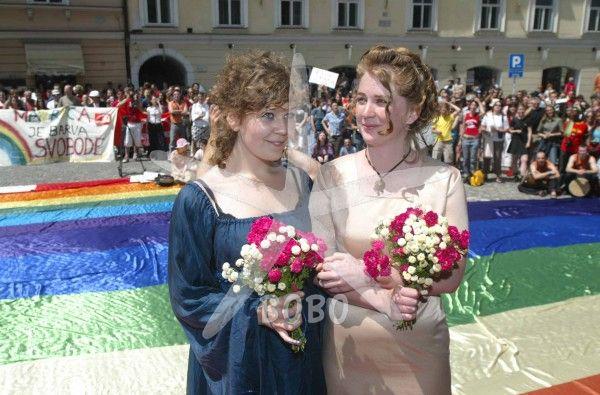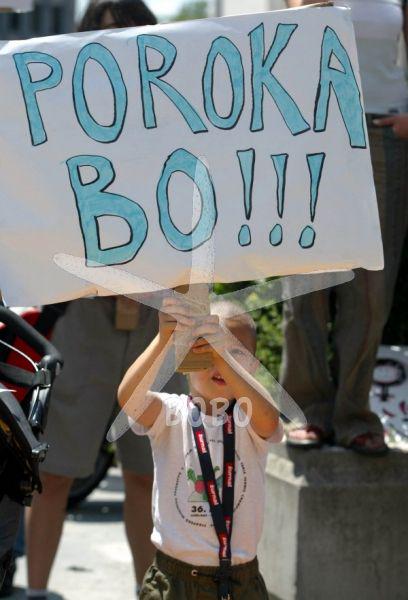
There’s no doubt in my mind that some people will take advantage of the situation and kick up a moralistic and populistic fuss. I’m talking about those who obviously need some legal or symbolic sign that their type of partnership is superior to others. I hope we’ve learned a lesson from the story about the Slovenian Family Code. I hope we won’t allow those who scream the loudest and those who already have rights to tread on those who still don’t enjoy those same rights.
According to the bill, administrative offices will no longer try to determine whether conditions to change a registered same-sex union to a partnership are met. Moreover, it is for the partners to decide whether they want a change of status. Their decision will be effective immediately.

The really bothersome part is that we had already had a systemic solution on the table (Marriage and Family Relations Act). Now it seems that we are taking a step back, even though this step is meant to be perceived as a step forward.

"The situation of same-sex couples will improve because homosexuals will be given the same kind of legal protection as heterosexuals. Homosexual families, however, will remain legally invisible. Those who proposed the bill failed to explain why same-sex couples are to be placed on an equal footing with heterosexual couples – except when it comes to family relations," sociologist Dr Roman Kuhar, a lecturer at the Faculty of Arts and a researcher at the Peace Institute, told MMC.
The Ministry's 'self-censorship'
He does, however, offer an answer as to why this situation came about: "The Act on Civil Partnership plays into the hands of the opponents of the Slovenian Family Code. Their intolerance forced the Ministry of Labour, Family, Social Affairs and Equal Opportunities to engage in self-censorship. But perhaps this kind of "self-censorship" was necessary because the ruling coalition itself is opposed to a comprehensive, i.e. a non-discriminatory, solution."
Why bother passing an interim law?
Kuhar maintains that we are opting for a partial solution because it seems pretty clear that either this act or the Marriage and Family Relations Act would have to be amended sooner or later. "The first step was made in 2005. Why are we taking another partial step this time around?" he wonders.
The act is a step back
"Although it appears to provide a comprehensive solution, we cannot gloss over the fact that
this comprehensiveness is in fact only partial because the legislation does not address the issue of family relations. The act is basically identical to the one proposed ten years ago. In this regard – and regarding the human rights of gays and lesbians in the EU – we are late in adopting this act. The really bothersome part is that we had already had a systemic solution on the table (Marriage and Family Relations Act). Now it seems that we are taking a step back, even though this step is meant to be perceived as a step forward," Kuhar says.
Admittedly, we are running late with the legislation
Even the Ministry of Labour, Family, Social Affairs and Equal Opportunities admits that it is slow in drawing up the legislation because both deadlines imposed on the government by the Constitutional Court – to eliminate the disparity of treatment between registered and non-registered homosexual unions in terms of inheritance – have already passed. So, what does the new act cover?
Eliminating registration procedures
Currently, same-sex unions are regulated by the Registration of a Same-Sex Civil Partnership Act (ZRIPS). The act recognizes civil unions and covers certain property relations. According to the Ministry of Labour, Family, Social Affairs and Equal Opportunities, the new act would abolish these registrations.
Full wedding ceremonies
Couples will now be allowed to have full wedding ceremonies. The bill is also to address certain other discriminatory practices, such as the right to health care during an unemployment period under the partner's health insurance plan, the right to visit one's incarcerated partner as a family member, the right to take over the tenancy of an apartment if one's partner dies, and other issues previously raised by the Constitutional Court. The Ministry, led by Anja Kopač Mrak, says that these provisions are an improvement over the previous situation.
How will partnerships be defined from now on?
"The Bill proposes that a partnership be defined as two women or two men entering a partnership. Partnership will have the same legal effects as marriage between opposite-sex couples," the Ministry said, adding, "The bill also regulates non-registered partnerships, i.e. long-term unions of two women or two men who have not registered their union. They will be on a par with heterosexual consensual unions. Our Ministry believes that people should not be discriminated against because of their sexual orientation."
Still discriminating between heterosexual and homosexual couples
We asked Roman Kuhar whether the bill would allow Slovenia to catch up with other European countries, and to what degree. "There are EU 11 countries in which homosexual and heterosexual couples are legally and symbolically equal, meaning that marriage is for both same-sex and opposite-sex couples. 12 countries have special laws on these issues, Slovenia being one of them. The new act will be no quantum leap: we will remain in the group of countries that treat same-sex and opposite-sex couples differently and have different institutions for them. But it is true that the institution itself will experience significant improvement," Kuhar concluded.
Saša Banjanac Lubej;
translated by D.V.
There’s no doubt in my mind that some people will take advantage of the situation and kick up a moralistic and populistic fuss. I’m talking about those who obviously need some legal or symbolic sign that their type of partnership is superior to others. I hope we’ve learned a lesson from the story about the Slovenian Family Code. I hope we won’t allow those who scream the loudest and those who already have rights to tread on those who still don’t enjoy those same rights.
According to the bill, administrative offices will no longer try to determine whether conditions to change a registered same-sex union to a partnership are met. Moreover, it is for the partners to decide whether they want a change of status. Their decision will be effective immediately.
The really bothersome part is that we had already had a systemic solution on the table (Marriage and Family Relations Act). Now it seems that we are taking a step back, even though this step is meant to be perceived as a step forward.

































































